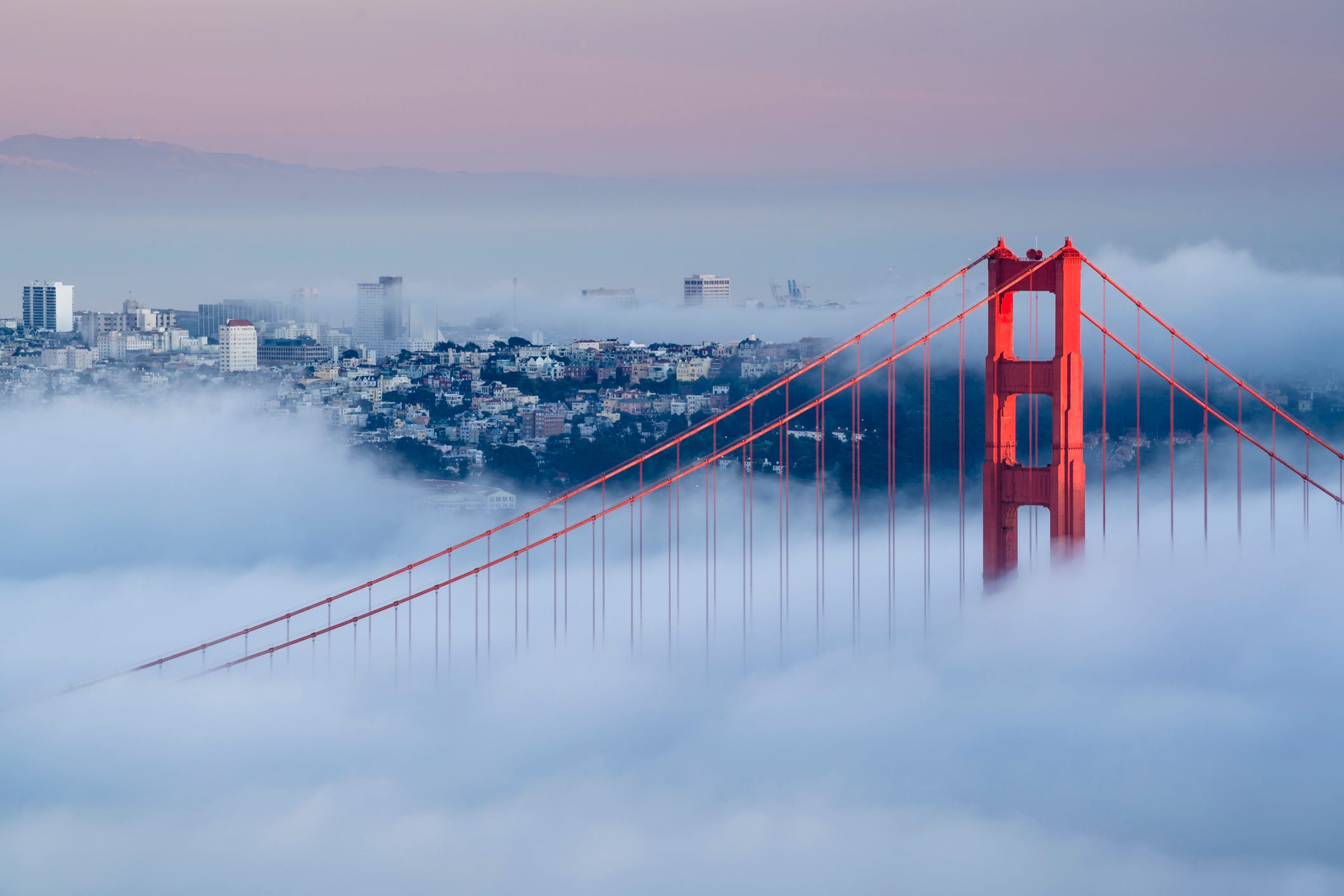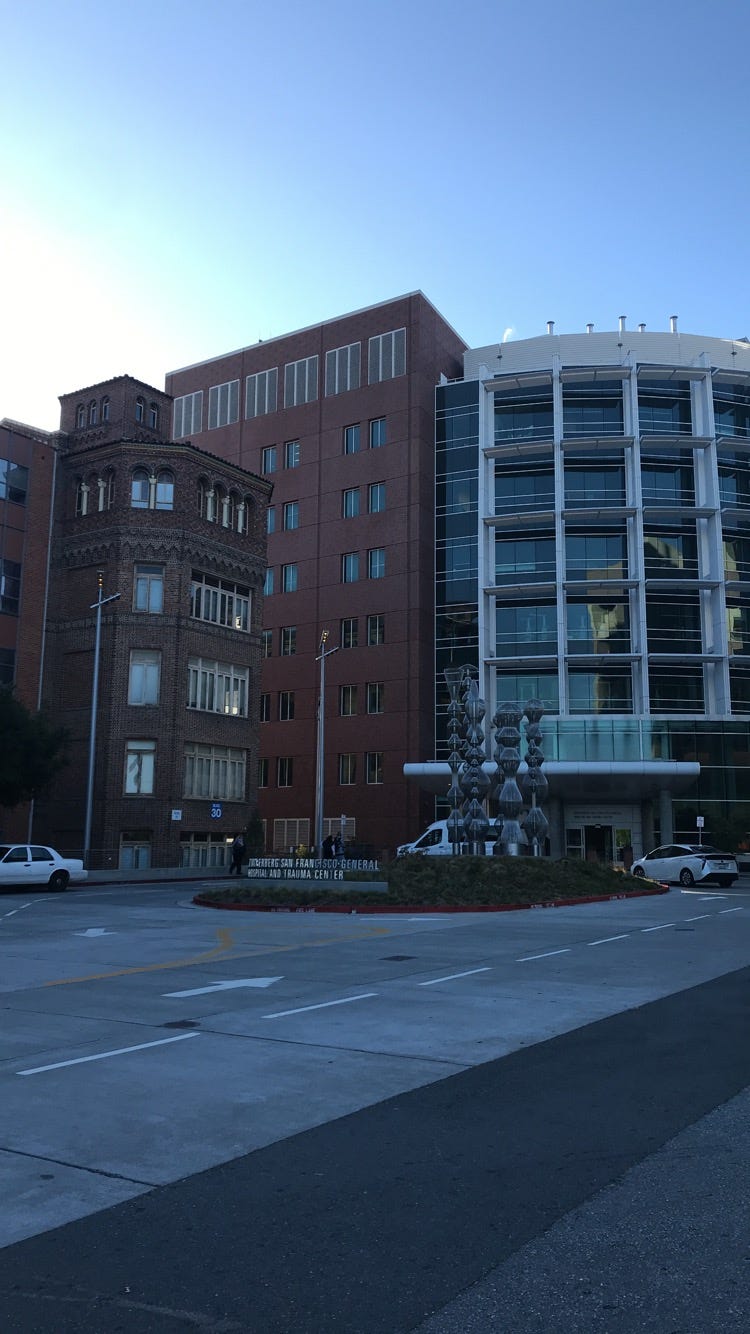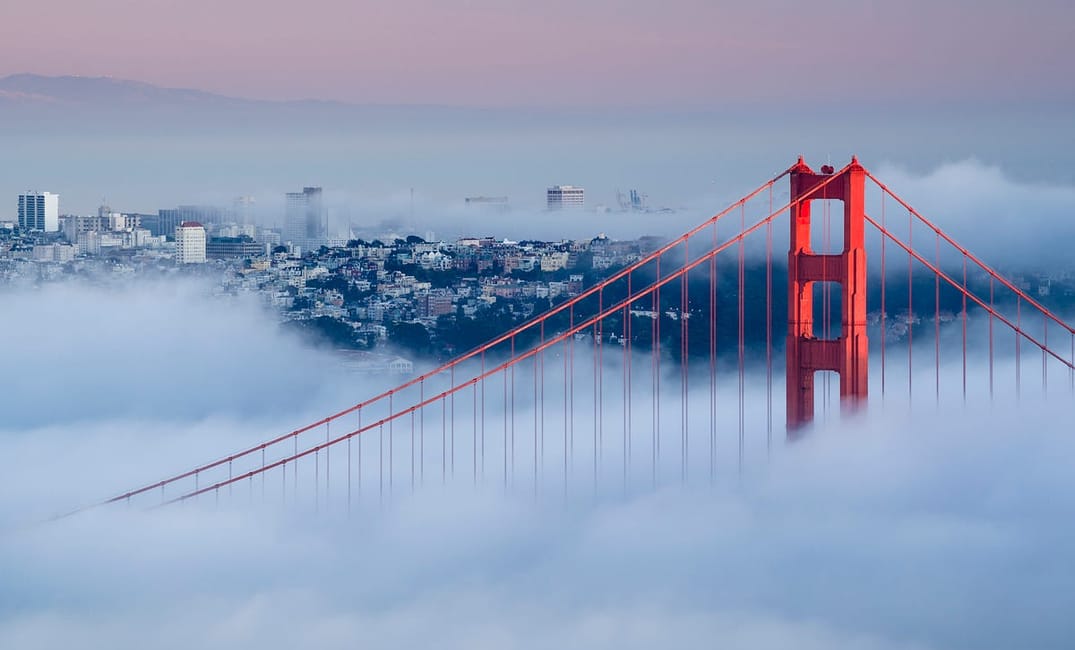
I first visited San Francisco for my interview day at UCSF School of Medicine, and it was love at first sight. I was charmed by every little thing, from the view of the hospitals atop the Parnassus hill draped in the morning fog, to the rows of colorful Victorian houses that seemed to dot every street, to the city trees that created canopies over sidewalks.
I had forgotten to appreciate the tips of the bridge, I was annoyed at the fog and longed for sunshine.
After my interview, we dined at an uncomfortably vegan restaurant, explored murals tucked into alleys, and we hopped on a cable car that pulled us up to the marina where I got an elaborate Ghirardelli confection. We took the ferry to Sausalito and standing at the helm of the boat, gusts of a winter wind blowing against my face, I couldn’t stop smiling at how the sunlight hit the water.
When I first moved into my apartment in the Inner Sunset, I noticed that when I stepped onto the sidewalk outside our home on a clear day, I could see the very tips of the Golden Gate Bridge. I remember hoping that I would never take this view for granted. Even the heavy August fog at the start of school couldn’t dampen my spirits. I was living the dream.
My first instinct was to search for bright sides to their situations but very quickly I learned that searching for a silver lining felt wrong.
I had never really lived in a city before. Of course, there was homelessness in my small towns growing up but it was easier to ignore, with folks who lived on the street relegated to areas I didn’t spend much time in. In San Francisco, it was impossible to miss. Everywhere I went, there was someone sitting or lying or sleeping on the sidewalk. I felt so guilty walking by them. I wanted to say or do the right thing, but I couldn’t figure out what that was supposed to be so I said nothing at all.
In my first month of medical school, I visited MSC-South Homeless Shelter—the city’s largest shelter—to help facilitate a support group for the women who lived there.
I’d never been to a shelter before. It wasn’t a place where people could get a moment of quiet, or leave their things around without getting stolen. Bunkbeds were squeezed right next to each other, and tensions between neighbors could run high. We’d try to cajole each woman into joining our group, where we’d munch on Trader Joe’s snacks and listen to the women air their frustrations and share bits of their stories. Some of the conversations were uneven, and some of the women didn’t get along with each other.
I hadn’t given much thought to exploring the nooks and crannies of the city that had been my home base — until the pandemic hit and I had no choice.
My first instinct was to search for bright sides to their situations but very quickly I learned that searching for a silver lining felt wrong. Sometimes the most optimistic thing I could do was to make someone feel heard and repeat back what they shared with me. There was power in bearing witness, even when there wasn’t room for connection.
When I started my clinical rotations at San Francisco General Hospital. I saw a mother who couch-surfed with sick kids, a man who used amphetamines to cope with living on the streets. We admitted multiple patients who were afraid they’d lose their shelter bed. In my afternoon lulls, I’d circle back to these folks, who were so easy to reduce to their housing situations, and I learned that many were thinkers and artists and community builders. They opened up to me about their lives, about mental health and addiction, they cheered me on and told me I’d make a great doctor one day. I got really attached. I was learning the basics of medicine but also beautiful lessons about life and difference.

I had housed patients too. Many had grown up in the Mission or Potrero Hill, surrounded by slowly vanishing neighborhoods. Some had huge families who visited the hospital often. Some had charts with documented losses that brought me to my knees. I felt guilty for the tenderness life had shown me while denying my patients the same. And yet, these individuals taught me something about living against the odds. They started to show me that happiness wasn’t always reliant on material security, that there were ways to carve out humor and joy and community even when survival felt uncertain.
During my third year of medical school, I found myself full of learning and wonder, but it was exhausting. I had forgotten to appreciate the tips of the bridge, I was annoyed at the fog and longed for sunshine. I left for three months to study for one brutal licensing exam, and on February 29th, 2020, I returned to San Francisco ready for my fourth and final year of medical school.
This woman in front of me, who I could have so easily walked past without a second thought, was speaking the words of the Buddha. I don’t remember what I said next, but she told me that she loved me.
Whether it was the pandemic that flipped this switch or the realization that my next step of training would take me out of the city, I wanted to snap out of going through the motions and stop taking the city for granted. I wanted to rekindle the flame.
My ability to notice the wonders of San Francisco had been worn down by the day-to-day demands of my role as a medical student. I had my routine: going to the grocery store, meeting up with friends at a few restaurants I liked, maybe trying a new cafe to work in. In the free time that my fourth year afforded me, I’d been planning to travel the world. I hadn’t given much thought to exploring the nooks and crannies of the city that had been my home base — until the pandemic hit and I had no choice.
In the early weeks of shelter-in-place, I started walking every day. Up until that point, I had only walked to get somewhere but now I was wandering aimlessly, trying to combat cabin fever. I had also started pausing when I saw folks sitting on the sidewalk. From a safe distance with a mask on, of course, I’d ask how their day was going and I’d often be surprised by what people shared. They all reminded me so much of my patients. The pandemic had taken away so many of the little interactions with strangers that filled my cup during the day, making these moments even more precious.
One day, on my way out of San Francisco General, I walked past a woman in the throes of a meltdown. I asked how her day was going and immediately regretted it; it was clear she wasn’t having a good time. But she thanked me for asking. We got to chatting, I tried to normalize how hard things are for everyone as if she wasn’t intimately acquainted with this knowledge already. At one point, she looked me in the eye and said: “you know, you and I aren’t all that different. You probably think that we are — but we’re not.”
I froze. The day before, I had listened to a podcast where a Buddhist monk spoke about the deep interconnectedness of our lives, how we grasp onto separation and try to live on our own islands when really we are all parts of each other. This woman in front of me, who I could have so easily walked past without a second thought, was speaking the words of the Buddha. I don’t remember what I said next, but she told me that she loved me. And I told her that I thought I loved her too.
My training at San Francisco General completely changed how I engaged with San Francisco. I’m no longer afraid of people who belong in this city just as much as I do. My four years here have been so much richer for meeting the people, housed and unhoused alike, who call our city home. I might be leaving, but I’m taking the lessons and memories with me.
San Francisco is where I became a doctor. I’ll remember evening walks under a new moon sky, stars twinkling through the fog. I’ll remember stunning landscapes of hills and cliffs decorated with wildflowers against sparkling pastel water. I’ll remember outdoor brunches and Ocean Beach bonfires and protests and drag shows and late nights dancing in streets bursting with colorful art that invited me to tap into my own creative spirit. I’ll remember the strangers who became friends. And I’ll remember all the times I looked out at the city from the windows of San Francisco General, marveling at how I got to be right there, in the center of the magic.
Juhi Varshney graduated from UCSF School of Medicine in May 2021 and will begin her emergency medicine residency at Jackson Memorial Hospital in Miami.







